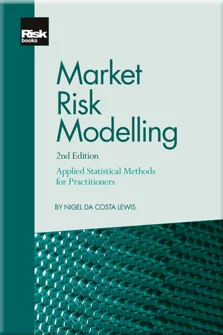Key Concepts on Probability
Key Concepts on Probability
Preface
Risk Modelling and its Myths
Mastering the R Statistical Package
Key Concepts on Probability
Tools for Describing Risk Factors and Portfolios
The Essentials of Hypothesis Testing for Risk Managers
Alternative Methods to Measure Correlation
A Primer On Maximum Likelihood Estimation
Regression in a Nutshell
Fitting Probability Distributions to Data
Practical Principal Components Analysis
Three Essential Models for Volatility
Random Numbers and Applied Simulation
Tail Risk Modelling
Conclusion to 'Market Risk Modelling (2nd edition)'
Probability, randomness and risk are concepts intertwined in the popular view of the financial markets. We face risk when there is a chance of loss. A chance of loss is assumed to occur with a specific probability, and an event could be deemed random if we cannot control the outcome. Since our task is primarily empirical, we will need to use data to attempt to figure out risk, probabilities and the nature of randomness. To do this we will need to develop suitable models that describe and explain the characteristics of the data. These models need not be complex, but they will need to cater for uncertainty, which is inherent in financial data. This uncertainty can be captured in many cases by using probability. Underlying all statistical methods are the concepts of a random experiment (or experiment of chance) and random variable.
THE BASICS OF RANDOM VARIABLES
Take, for example, the price of Brent crude oil futures – it varies from one day to the next because there are factors affecting the price on any particularly day which are unknown or cannot be measured. In the language of statistics, the crude oil futures price is a random variable, trading activity an “experiment”, the
Copyright Infopro Digital Limited. All rights reserved.
As outlined in our terms and conditions, https://www.infopro-digital.com/terms-and-conditions/subscriptions/ (point 2.4), printing is limited to a single copy.
If you would like to purchase additional rights please email info@risk.net
Copyright Infopro Digital Limited. All rights reserved.
You may share this content using our article tools. As outlined in our terms and conditions, https://www.infopro-digital.com/terms-and-conditions/subscriptions/ (clause 2.4), an Authorised User may only make one copy of the materials for their own personal use. You must also comply with the restrictions in clause 2.5.
If you would like to purchase additional rights please email info@risk.net











